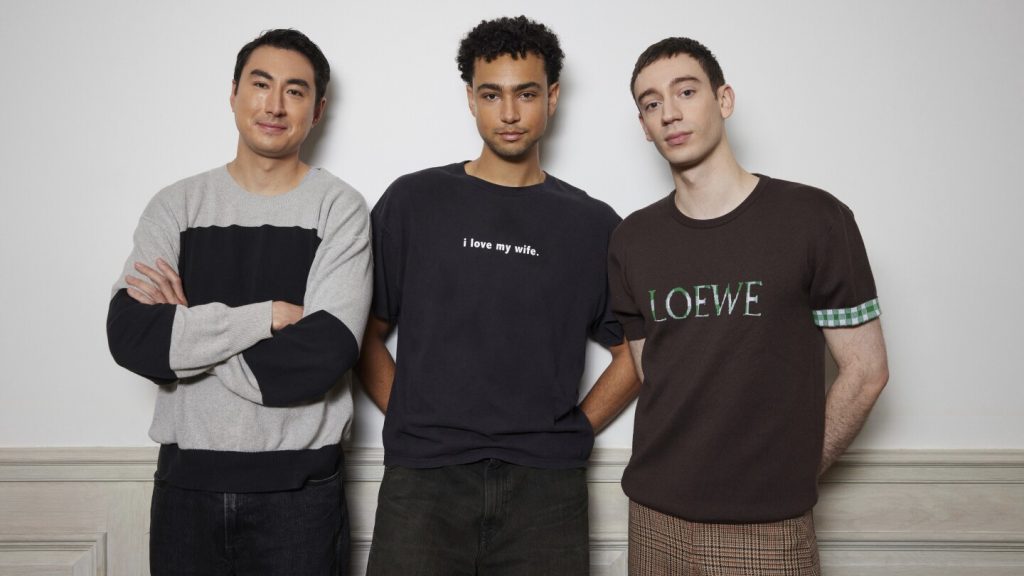Fandom has taken on a new dimension in the age of social media. As one scrolls through their feeds, it can feel like an intimate understanding of celebrities and their circles has been gained. The new film “Lurker,” which is gaining attention at Sundance and is set to release in theaters Friday, delves into what could occur if a certain type of aficionado infiltrates the celebrity sphere and how far they might go to maintain their presence there.
Oliver, portrayed by Archie Madekwe, is unaware of the surprises ahead when he enters a fashionable clothing store in Los Angeles. As an up-and-coming music star, he’s used to receiving attention, with requests for selfies and autographs a routine expectation. Thus, he is taken aback when Matthew, played by Théodore Pellerin, doesn’t recognize him or express any interest. Oblivious to the facade, Oliver invites this stranger to join his entourage.
Pellerin explained, “At first, Matthew views Oliver as someone who is inherently successful and celebrated. However, he soon realizes that he must adapt to fit into Oliver’s universe and cater to his needs. They both operate under a set of unwritten rules dictated by Oliver, but if the balance of power shifts to Matthew, he could redefine those rules.”
A Promising Script and Debut Director
“Lurker” marks the directorial debut of Alex Russell, whose reputation is also on the rise. He penned the acclaimed episode “Forks” from “The Bear,” and garnered an Emmy for his work on Netflix’s “Beef.” His screenplay for “Lurker,” crafted during the COVID lockdowns, quickly gained interest. Madekwe initially felt disappointed when he didn’t receive feedback after auditioning for a different role.
Years later, Madekwe learned Russell wanted to meet him—not for the character he originally auditioned for, but for Oliver. “It required a complete reconsideration of the film’s essence,” Madekwe shared. “I was daunted by the thought of convincing Alex that I could embody such a trendy character.” However, Russell had been quietly observing Madekwe in a coffee shop after receiving a recommendation, concluding: This is Oliver.
A Collaborative Effort Among Young Talent
As a newcomer to directing, Russell was aware of the challenges presented by working on an independent film, where casting and hiring can be expedited. “I aimed to cast underappreciated actors, those who could significantly elevate the film,” Russell stated. “This approach allows for a more impressive outcome, even with a modest budget.” This philosophy extended beyond the leads to the full ensemble, including Sunny Suljic, Havana Rose Liu, Zack Fox, and Daniel Zolghadri—recognizable faces that are still on the rise.
The experience of making “Lurker” was rewarding, despite budget and time constraints. “I was fortunate with the decisions made early on regarding casting and hiring,” Russell reflected. “I was just a newcomer with a screenplay, relying on everyone else’s expertise.” When directing, his chief question was, “Do I believe it?” He trusted that if he found it convincing, so would the audience.
Frequent visits from friends in the music industry added a unique ambiance to the filming environment. Pellerin noted, “The atmosphere mirrored the movie itself—a gathering of young creatives. The vibrant LA film and music scene was palpable, enriching the film’s fun aspects.” Many involved described the process as highly collaborative. Madekwe also took on a producer role, actively participating in major creative decisions, including casting choices and music selection, like a song by Rex Orange County.
A Relevant Thriller for Today’s Society
Madekwe remarked, “This film holds significant importance today. Our relationships with unfamiliar individuals are an intriguing subject, and it’s thrilling to witness the emergence of Alex Russell as a filmmaker destined for success.” Russell cited “obsessive thrillers” like “Whiplash” and “Black Swan” as inspirations, questioning, “What if the pursuit was social advancement?” The shifting power dynamics between Matthew and Oliver resonate beyond celebrities, reflecting applicable themes among any group of friends. As Russell summarized, “When faced with messages from a new shiny friend and an old one, who do you reply to first?”



